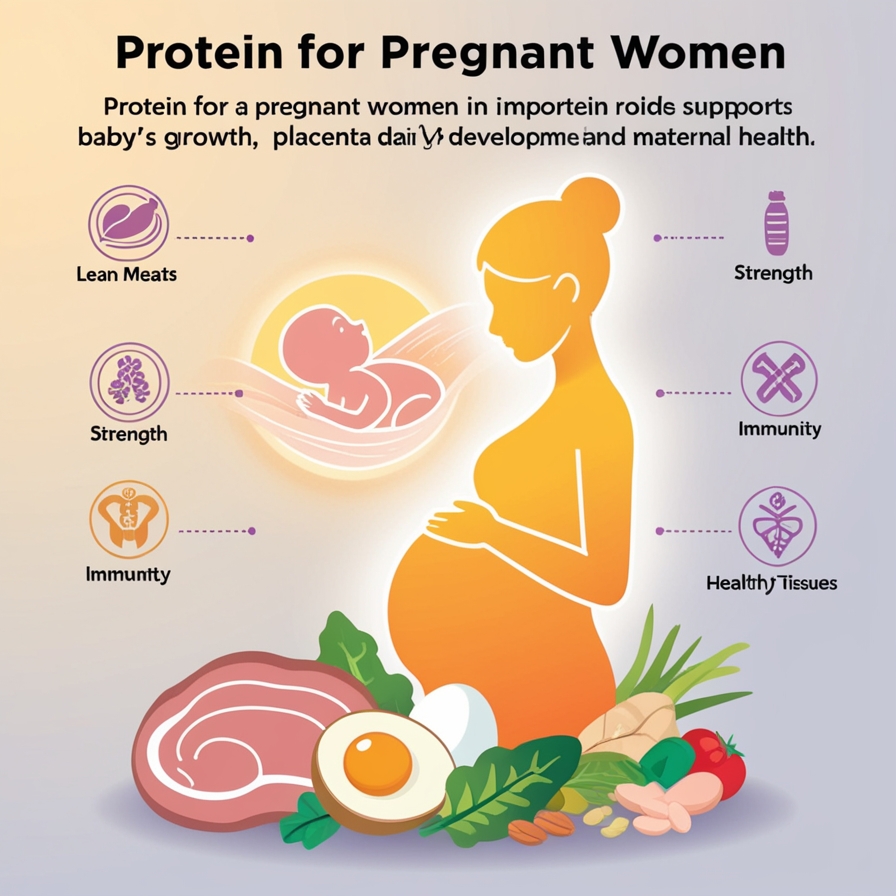Protein is a vital nutrient for everyone, but during pregnancy, its importance is amplified, it plays a key role in supporting the growth and development of the baby while maintaining the mother’s health, here’s a closer look at why protein is crucial during pregnancy.
1. Supports Baby’s Growth
- Protein is the building block for your baby’s tissues, organs, and cells.
- It aids in the development of the baby’s brain, heart, and muscles, laying the foundation for a healthy start in life.
2. Promotes Placenta Development
- The placenta, which nourishes and supports the baby, relies on protein for its formation and function.
- A strong and healthy placenta ensures efficient nutrient and oxygen transfer to the baby.
3. Builds Maternal Tissues
- During pregnancy, the mother’s body undergoes significant changes, such as increased blood volume and breast tissue growth.
- Protein helps build and repair these tissues, preparing the body for childbirth and breastfeeding.
4. Balances Hormones
- Many pregnancy hormones are protein based, adequate protein intake ensures hormonal balance, which is crucial for a healthy pregnancy.
5. Prevents Muscle Loss
- Pregnancy increases the body’s energy demands, protein helps preserve muscle mass while providing energy for both the mother and baby.
6. Supports Immune Function
- Proteins form antibodies that help protect both mother and baby from infections, ensuring a healthy pregnancy journey.
7. Reduces Risk of Complications
- Consuming adequate protein may reduce the risk of pregnancy complications, such as low birth weight or preterm labor.
- Pregnant? Beware of These Medications! A Must-Read Guide for Expecting Moms
(Read More Here)
How Much Protein Do Pregnant Women Need?
The recommended protein intake for pregnant women varies but generally falls between 75–100 grams per day, depending on factors like body weight, activity level, and trimester, protein needs increase as pregnancy progresses, especially during the second and third trimesters when the baby’s growth accelerates.
Best Protein Sources for Pregnant Women
-
Animal-Based Proteins
- Lean meats (chicken, turkey)
- Fish (low in mercury, e.g., salmon)
- Eggs
- Dairy products (milk, yogurt, cheese)
-
Plant-Based Proteins
- Beans and lentils
- Tofu and tempeh
- Nuts and seeds
- Whole grains (quinoa, oats)
-
Protein Supplements
- For women struggling to meet their protein needs through food, protein powders or shakes can be a helpful addition (consult a doctor before use)
Tips for Incorporating Protein During Pregnancy
- Add eggs or Greek yogurt to breakfast.
- Snack on nuts, seeds, or hummus with vegetables.
- Include lean meat, fish, or legumes in lunch and dinner.
- Blend protein-rich smoothies with fruits and nut butter.
The Bottom Line
Protein is indispensable for a healthy pregnancy, benefiting both mother and baby, by prioritizing protein rich foods, expectant mothers can support their baby’s development and maintain their own health throughout this transformative journey.
Have questions about pregnancy nutrition or tips for boosting protein intake? share your thoughts in the comments! If this article was helpful, don’t forget to share it with other moms to be.

